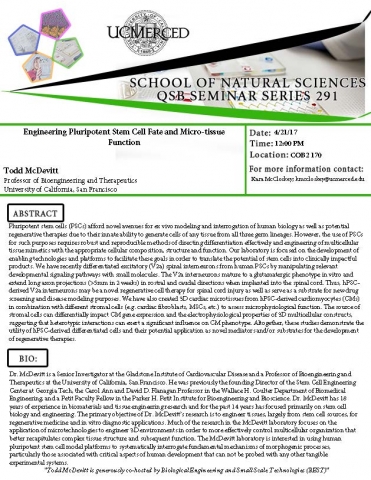Todd McDevitt, University of California, San Francisco
Abstract:
Pluripotent stem cells (PSCs) afford novel avenues for ex vivo modeling and interrogation of human biology as well as potential regenerative therapies due to their innate ability to generate cells of any tissue from all three germ lineages. However, the use of PSCs for such purposes requires robust and reproducible methods of directing differentiation effectively and engineering of multicellular tissue mimetics with the appropriate cellular composition, structure and function. Our laboratory is focused on the development of enabling technologies and platforms to facilitate these goals in order to translate the potential of stem cells into clinically impactful products. We have recently differentiated excitatory (V2a) spinal interneurons from human PSCs by manipulating relevant developmental signaling pathways with small molecules. The V2a interneurons mature to a glutamatergic phenotype in vitro and extend long axon projections (>5mm in 2 weeks) in rostral and caudal directions when implanted into the spinal cord. Thus, hPSC-derived V2a interneurons may be a novel regenerative cell therapy for spinal cord injury as well as serve as a substrate for new drug screening and disease modeling purposes. We have also created 3D cardiac microtissues from hPSC-derived cardiomyocytes (CMs) in combination with different stromal cells (e.g. cardiac fibroblasts, MSCs, etc.) to assess microphysiological function. The source of stromal cells can differentially impact CM gene expression and the electrophysiological properties of 3D multicellular constructs, suggesting that heterotypic interactions can exert a significant influence on CM phenotype. Altogether, these studies demonstrate the utility of hPSC-derived differentiated cells and their potential application as novel mediators and/or substrates for the development of regenerative therapies.




